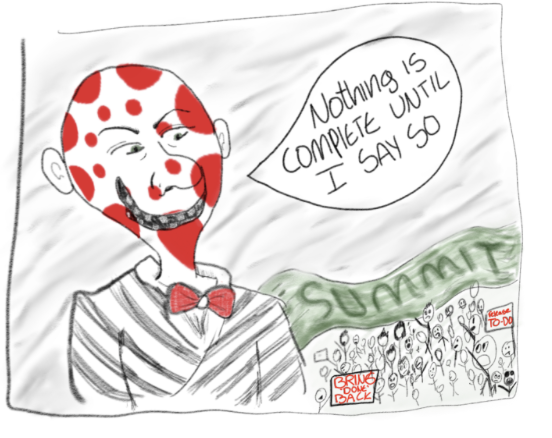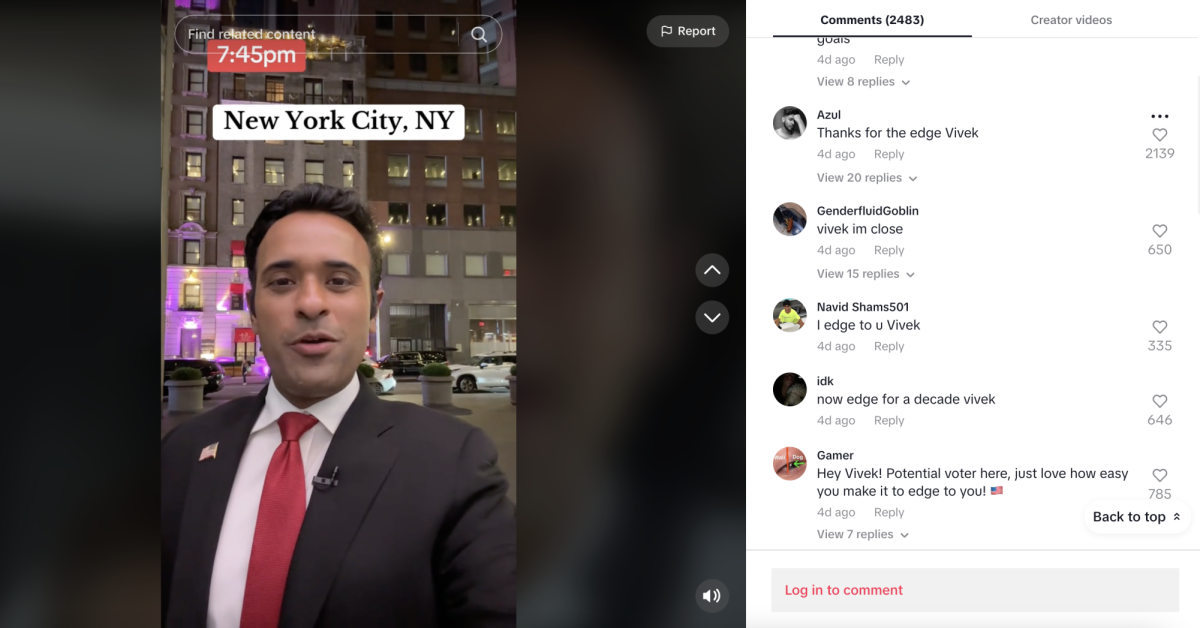Many Americans were introduced to 38-year-old biotech engineer Vivek Ramaswamy during the first GOP presidential debate last month. Ramaswamy introduced himself as a “skinny guy with a funny last name.” Many news outlets championed Ramaswamy as the victor of the debate, catapulting the political rookie to fame during Donald Trump’s noticeable absence. Since then, Ramaswamy has been grappling with creating a singular identity—a task he has yet to accomplish, and has alienated many young voters in the process.
From the beginning of Ramaswamy’s campaign, it became clear that he wanted to appeal to younger voters. With a newly popularized TikTok profile and a laid-back demeanor, Ramaswamy used his historic lack of political participation to market himself as a fresh face who isn’t “bought and paid for,” as he frequently likes to say.
Appealing to a younger generation isn’t as easy as it seems, though. For many future voters, the politics as a whole is inherently flawed, and Ramaswamy’s TikTok comment sections make jokes out of him, too.
“A lot of younger people are cynical about politics and believe politicians are corrupt,” said Summit government teacher Travis Overly. “If you have one guy stand out as different, to condemn it, it can be attractive to younger viewers.”
For some viewers, this tactic is extremely effective. Ramaswamy has played into alt-right talking points, those popularized by figures like Andrew Tate or Ben Shapiro, ones that feed on the weaknesses of impressionable viewers. Clips of Ramaswamy have flooded highly conservative channels where the candidate’s disdain for “woke culture” and “reverse discrimination” has resonated with the young, white Americans who claim to be disenfranchised.
Ramaswamy’s social media presence has spilt over to mainstream channels as well. According to Summit teacher Erin Caroll, “I’m not a Republican, and as far as my TikTok ‘For You Page’ is concerned I don’t engage with that content, but I still knew of him and saw videos by him.”
Some clips of Ramaswamy seem pretty reasonable: espousing disapproval of political divisions, career politicians and the often-painful (lack of) efficiency of bureaucracy. Caroll warns of this “double edged sword.”
“On one hand, [posting political advertisements on social media] can allow people to be aware of politicians and do their own research,” said Caroll. “But on the other hand, it allows people to just see these politicians and take what they’re saying at face value.”
Behind these misleading clips, Ramaswamy is far from moderate. Some of his policies call for militarization of our border, repealing birthright citizenship and abolishment of the Department of Education. One particular policy is Ramaswamy’s vow to raise the voting age to 25, unless the citizen serves in the military or passes a civics test. A policy so unpopular that his own campaign staff detest it, according to an anonymous adviser to Ramaswamy’s campaign.
To reconcile this loss of support from some Gen Z-ers, Ramaswamy has gone back on his hatred for TikTok, which he once called “digital fentanyl,” and created an account of his own. Prior to the creation of Ramaswamy’s account, those clips in circulation were just reposts from podcast appearances, or his Twitter. Ramaswamy urged the youth to ask him questions and interact with him. This style of digital openness in politics heavily mirrors Alexandria Ocasio-Cortez (more commonly known as “AOC”), a young New York representative who answers the public’s questions through her Instagram account. Curiously, AOC is incredibly popular with younger voters—although she most likely doesn’t represent them.
And young viewers certainly listened—among Ramaswamy’s few videos, are seas of comments all saying some variation of, “Vivek, I edge to you.” You can do your own research on what that means, but contextually, the response underscores Ramaswamy’s struggle to be perceived as legitimate. Even with his dominating social media presence. This style of politics—presenting a candidate as a product rather than an individual—reflects a new era of campaigning in the most recent rat-race to the White House.


































